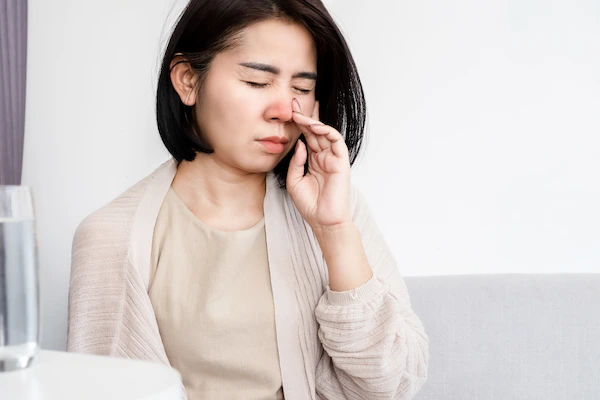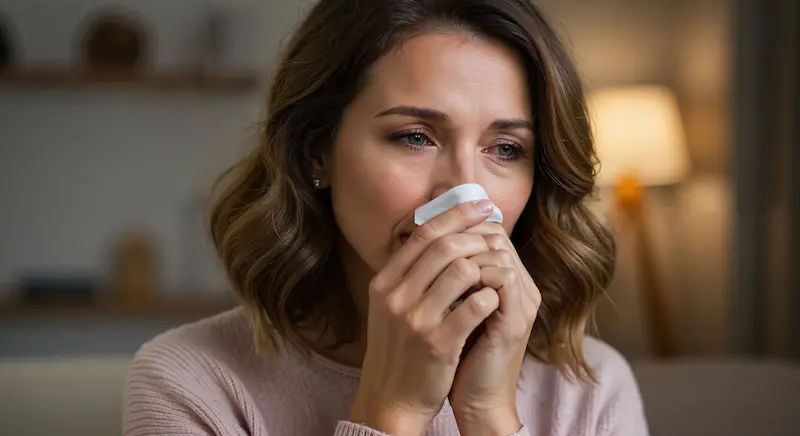Simple Home Remedies to Stop Sneezing Naturally
Discover safe, science-backed sneezing remedies and allergy relief at home: saline rinses, cleaner air, trigger control, and when to seek medical care.

Written by Dr. M L Ezhilarasan
Reviewed by Dr. Mohammed Kamran MBBS, FIDM
Last updated on 13th Jan, 2026

Introduction
Sneezing may seem like a small nuisance, but when it becomes frequent, persistent, or predictable during certain seasons, it can disrupt sleep, work, and daily comfort. For many people, allergies are the main culprit—though colds, irritants, and environmental changes can all play a role. The good news is that you can try a range of safe, evidence-informed sneezing remedies at home to calm symptoms and support long-term allergy relief. This guide explains why sneezing happens, what helps, what to avoid, and how to make your home and habits more “sneeze-safe” using guidance consistent with trusted medical recommendations.
Consult a Top General Practitioner for Personalised Advice
Why Do You Sneeze (And What It Means)?
Sneezing is your body’s natural reflex to clear irritants from the nasal passages. It is protective, but when triggered repeatedly, it can indicate an underlying cause.
Common Triggers
Some common triggers include:
- Allergens: pollen, dust mites, pet dander, mould
- Irritants: smoke, strong fragrances, aerosol sprays, chemical cleaners, pollution
- Infections: colds and other viral respiratory infections
- Environmental changes: dry air, sudden temperature shifts, indoor heating
When Allergies Are Likely
- Sneezing accompanied by itchy eyes or nose
- Clear, watery nasal discharge
- Symptoms that come and go with specific exposures (e.g., pets, freshly cut grass, changing seasons)
When a Cold May Be the Cause
- Fever
- Sore throat
- Body aches
- A combination of symptoms that settle within one or two weeks
Quick, Safe Sneezing Remedies You Can Try Today
Quick and safe sneezing remedies include:
Saline Nasal Rinses: A Top Evidence-Backed Home Remedy
- Saline nasal irrigation helps flush out allergens, thin mucus, and soothe nasal irritation. Many people experience quick relief from sneezing, congestion, and itchiness.
How to Use Saline Safely
- Use only sterile water, such as distilled, sterile, or boiled-and-cooled water.
- Avoid unsterilised tap water unless correctly treated.
- Choose pre-mixed saline or use pre-measured packets with a neti pot or squeeze bottle.
- Lean over a sink, follow the device instructions, and allow the rinse to flow through the nasal passage.
- Clean and air-dry the device after each use.
- Start once daily during allergy flare-ups; adjust depending on comfort and advice from a healthcare professional.
Gentle Steam and Humidity for Comfort
Warm steam helps loosen mucus, soothe irritation, and ease dryness inside the nose.
Tips for Safe Humidity Use
- Keep indoor humidity between 30% and 50% to prevent dry air without encouraging mould and dust mites.
- Clean humidifiers according to the manufacturer's guidance to prevent bacterial or mould growth.
- Avoid very hot steam to reduce the risk of burns.
- Warm showers can offer similar soothing effects without the need for special equipment.
Improve Your Indoor Air for Lasting Allergy Relief
If your sneezing is allergy-related, reducing exposure to allergens inside your home can make a significant difference. Find the list of things to do:
Indoor Air Improvements
- Use a HEPA air purifier in frequently used rooms, especially the bedroom.
- Vacuum carpets and rugs with a HEPA-equipped vacuum cleaner.
- Damp-dust surfaces weekly to prevent allergen build-up.
Dust Mite Reduction Tips
- Wash bedding weekly in hot water (at least 54°C / 130°F).
- Use allergen-proof covers for pillows and mattresses.
- Maintain humidity under 50% to limit dust mite growth.
Preventing Mould
- Fix leaks promptly.
- Use exhaust fans during cooking and showering.
- Clean any visible mould as soon as it appears.
Reducing Irritants
- Use fragrance-free cleaning and laundry products.
- Avoid scented candles and aerosol sprays.
- Keep pets out of the bedroom, especially if you are sensitive to dander.
Outdoor Allergy Relief Strategies
Small adjustments can help minimise sneezing when spending time outdoors during high-pollen seasons.
How to Reduce Outdoor Trigger Exposure?
The outdoor trigger can be kept in check by:
- Check daily pollen forecasts and plan outdoor activities when levels are lower—often after rainfall or later in the day.
- Keep windows closed during peak pollen times; use air conditioning with recirculation mode.
- After being outside:
- Change your clothes
- Shower
- Rinse your hair
This removes pollen that may otherwise trigger symptoms indoors.
- Wear wraparound sunglasses and a brimmed hat to limit pollen exposure to the eyes.
- Consider a well-fitted high-filtration mask on windy or high-pollen days to reduce inhaled allergens.
Stay Hydrated and Soothe the Nose
Hydration and gentle protection for nasal skin can help reduce discomfort from frequent sneezing and wiping. It can be done by:
Simple Comfort Measures
Some simple comfort measures are:
- Drink plenty of water and warm, non-caffeinated fluids to keep mucus thin.
- Apply a thin layer of unscented ointment (such as petroleum jelly) around the nostril edges to prevent irritation and cracking.
Avoid Common Triggers and Irritants
Reducing unnecessary irritants can decrease the frequency of sneezing episodes.
What to Avoid?
Things to avoid include:
- Do not smoke, and avoid secondhand smoke and vaping aerosols.
- Minimise exposure to strong fragrances, perfumed candles, and aerosol sprays.
- Use ventilation or exhaust fans when cooking or cleaning.
What Not to Do (Common Myths and Mistakes)
Find the list below of things to be avoided:
Pitfalls to Avoid
- Do not overuse decongestant nasal sprays such as oxymetazoline for more than three days, as they may cause rebound congestion.
- Be cautious with natural remedies lacking clear evidence—such as local honey, which has not been shown to reliably reduce allergies.
- Use caution with essential oils, since strong scents may trigger sneezing for sensitive individuals.
- Avoid excessively high indoor humidity, which can encourage mould and dust mites.
When to Seek Medical Care?
Seek emergency care when you see these symptoms:
- Emergency Symptoms (Seek Help Immediately)
- Difficulty breathing
- Wheezing
- Swelling of the face, lips, or tongue
- Widespread hives
- Dizziness or fainting
These may indicate a severe allergic reaction (anaphylaxis).
When to Contact a Healthcare Professional?
Contact a healthcare professional when:
- Sneezing and congestion lasting more than two to three weeks
- Persistent fever, severe facial pain or pressure, or thick discharge that is not improving
- Symptoms interfering with school, work, or sleep
- Asthma symptoms triggered by allergies
- Uncertainty about whether symptoms are due to allergies, a cold, flu, or another condition
- Proven Medical Treatments to Know (If Home Steps Aren’t Enough)
If sneezing is driven by allergies, evidence-based medications may help significantly.
Treatment Options
- Intranasal steroid sprays: Reduce inflammation and are among the most effective treatments for allergic rhinitis.
- Antihistamines: Help reduce sneezing, nasal itching, and runny nose.
- Saline sprays or rinses: Can be used alongside other medicines for added relief.
- Allergy immunotherapy: Allergy shots or tablets may be recommended for long-term control if you have persistent, confirmed allergies.
Consult your GP or an allergist for a plan tailored to your symptoms, health conditions, and triggers.
Conclusion
Sneezing can be frustrating, but with the right strategies, most people can find meaningful relief. Simple home remedies—such as saline rinses, humidity control, and reducing exposure to allergens—work well alongside healthy habits like hydration and ventilation. Understanding your triggers helps you tailor your environment and routines for fewer symptoms and better comfort. If home measures aren’t enough, evidence-based medical treatments can provide additional support. With a combination of practical steps and professional guidance when needed, you can take control of sneezing and breathe more easily every day.
Consult a Top General Practitioner for Personalised Advice
Consult a Top General Practitioner for Personalised Advice

Dr. Rajib Ghose
General Physician/ Internal Medicine Specialist
25 Years • MBBS
East Midnapore
VIVEKANANDA SEBA SADAN, East Midnapore

Dr. Utsa Basu
Diabetologist
14 Years • MBBS , MD
Barasat
Diab-Eat-Ease, Barasat
(75+ Patients)

Dr. Ashita Kuruvilla
General Practitioner
7 Years • MBBS
Kolkata
KVC CLINIC, Kolkata

Dr. Rajesh R
General Practitioner
24 Years • MBBS
Bengaluru
Maruti Polyclinic and dental care, Bengaluru

Dr. Debdatta Pati
Psychiatrist
18 Years • MBBS, DPM, MD (PSYCHIATRY)
Kolkata
MCR SUPER SPECIALITY POLY CLINIC & PATHOLOGY, Kolkata
Consult a Top General Practitioner for Personalised Advice

Dr. Rajib Ghose
General Physician/ Internal Medicine Specialist
25 Years • MBBS
East Midnapore
VIVEKANANDA SEBA SADAN, East Midnapore

Dr. Utsa Basu
Diabetologist
14 Years • MBBS , MD
Barasat
Diab-Eat-Ease, Barasat
(75+ Patients)

Dr. Ashita Kuruvilla
General Practitioner
7 Years • MBBS
Kolkata
KVC CLINIC, Kolkata

Dr. Rajesh R
General Practitioner
24 Years • MBBS
Bengaluru
Maruti Polyclinic and dental care, Bengaluru

Dr. Debdatta Pati
Psychiatrist
18 Years • MBBS, DPM, MD (PSYCHIATRY)
Kolkata
MCR SUPER SPECIALITY POLY CLINIC & PATHOLOGY, Kolkata
More articles from Nasal congestion
Frequently Asked Questions
What are the fastest sneezing remedies I can try at home?
Saline nasal rinses and immediate trigger control—such as stepping away from smoke or pollen, washing your face and hands, or changing clothes after being outdoors—can provide quick relief for many people.
Is saline nasal irrigation safe?
Yes, when performed correctly with sterile water and a clean device. If irritation occurs or symptoms worsen, stop and speak with a healthcare professional.
Can a mask reduce allergy-related sneezing outside?
A well-fitting mask can reduce exposure to pollen and other airborne particles, offering helpful protection on windy or high-pollen days.
Do air purifiers help with allergy relief?
HEPA air purifiers can lower airborne allergens such as pollen and pet dander. They work best when combined with allergen-proof bedding covers, weekly hot washing of bedding, HEPA vacuuming, and controlled humidity.
How can I tell if my sneezing is from allergies or a cold?
Allergy-related sneezing often includes itchy eyes or nose and a clear runny nose, with patterns linked to specific triggers. Colds are more likely to involve fever, sore throat, and body aches, improving in one to two weeks.



